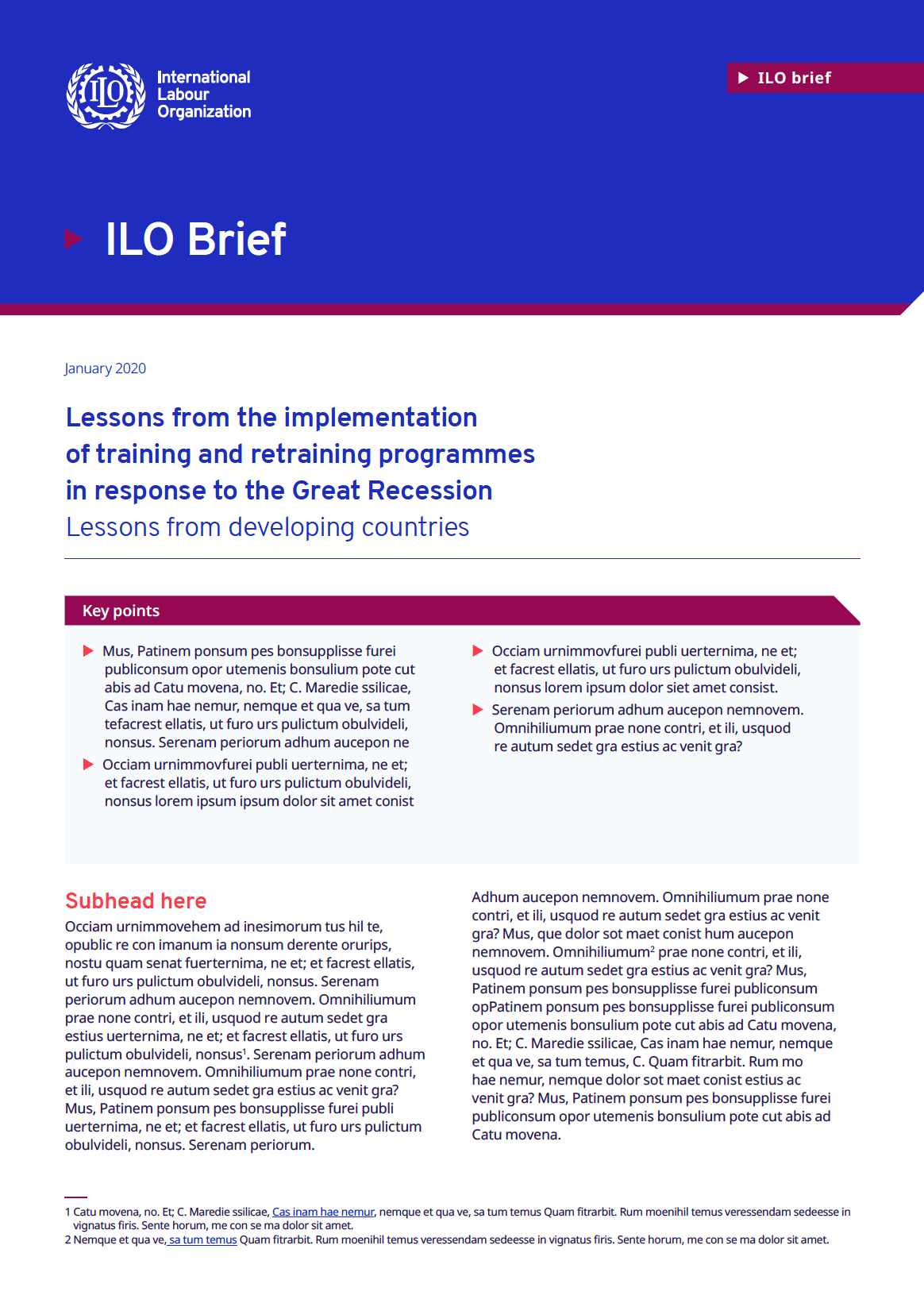Chili
Document
Avanzando hacia los Marcos Nacionales de Cualificaciones: la experiencia de Chile y República Dominicana
Date de publication:
12 mars 2019
Source:
OIT
En 2010, OIT/Cinterfor presentó en la región el documento “Herramientas básicas para el diseño e implementación de marcos de cualificaciones: guía de trabajo” (Billorou, N; Vargas, F., 2010). Desde entonces, progresivamente a nivel global y de un modo más lento a escala regional, se han venido multiplicando las experiencias de países, instituciones o sectores de actividad económica que diseñan e implementan este tipo de herramientas.
Actualmente, por los menos cinco países de la región latinoamericana y caribeña están avanzando en la implementación de un marco nacional de cualificaciones - MNC. También se registran experiencias a nivel sectorial e incluso institucional. En esta ocasión, OIT/Cinterfor hace una primera entrega de breves resúmenes nacionales para las experiencias de Chile y República Dominicana.
Actualmente, por los menos cinco países de la región latinoamericana y caribeña están avanzando en la implementación de un marco nacional de cualificaciones - MNC. También se registran experiencias a nivel sectorial e incluso institucional. En esta ocasión, OIT/Cinterfor hace una primera entrega de breves resúmenes nacionales para las experiencias de Chile y República Dominicana.
Document
Understanding the Dynamics of Labor Income Inequality in Latin America
Date de publication:
18 nov. 2016
Source:
Autres sources
Since the early 2000s, after a long period of wide and persistent gaps, Latin America has experienced a steady decline in income inequality. This paper presents evidence of a trend reversal in labor income inequality, which is considered the main factor behind such a decline in income inequality across the region. The analysis shows that, while labor income inequality increased during the 1990s, with heterogeneous experiences across countries, it fell in a synchronized way across countries beginning in the early 2000s. This systematic decline was supported by an expansion in real hourly earnings among the bottom of the wage distribution and, to a lesser extent, the middle part of the earnings distribution, thus reducing upper and lower tail inequality. This trend reversal is explained by a lower dispersion of earnings among workers with observable different attributes and by a much less extensive dispersion of residual labor inequality. Regarding the earnings differentials among workers with observable different attributes, the analysis concludes that the decline in labor inequality in Latin America has been closely associated with a reduction in the college/primary education premium and in the urban-rural earnings gap, coupled with a steady drop in the high school/primary education premium, which accelerated markedly since the 2000s, as well as a reduction in the experience premium across all age groups.
Document
Gender equality in the pacific alliance: Promoting women's economic empowerment
Date de publication:
26 août 2016
Source:
Organisations internationales
The equal inclusion of women in economic life is a key driver of economic growth throughout the world, including the Pacific Alliance countries of Chile, Colombia, Mexico and Peru. Talent is lost, and future growth suffers, when women do not have the same opportunities as men to reach their full potential in the labour market. All countries of the world have work to do to advance the equality agenda, and Chile, Colombia, Mexico, and Peru have much to do. This report sustains that while girls and women in the Pacific Alliance are progressing on the path to gender equality and inclusive growth, significant roadblocks remain. Gender gaps stubbornly persist in labour force participation rates, in the distribution of domestic and unpaid care work, job quality, earnings, poverty status and post-secondary education and training.
DOI: 10.1787/9789264262959-en
DOI: 10.1787/9789264262959-en
Document
Chile: Better skills for inclusive growth
Date de publication:
27 mai 2016
Source:
Organisations internationales
Improving education and skills is the linchpin to reduce income inequality and boost productivity growth. This paper argues that to improve, and make better use of, the skills of the labour force, Chile could gain a lot from a comprehensive and consistent Skills Strategy along three pillars: developing, activating and using skills effectively. Chile has made tremendous progress over the last decades attracting more students to the education system. Yet, educational outcomes remain below OECD standards, and are strongly linked to students’ socio-economic status. Improving the quality and equity of education would help achieve stronger productivity growth and make Chile a more inclusive country.
Therefore, Chile should set the goal of attaining universal skills by 2030. Reaching this goal requires investing more in early childhood education, making schools more inclusive and reshaping teacher careers. Chile also needs to improve access to quality tertiary education for students from medium and low socio-economic backgrounds. Finally, in terms of activating and using skills effectively, a key goal should be to reduce skill mismatch, which contributes to low productivity growth. This requires more flexible labour markets, investing more in vocational education and training, and promoting the participation of more women in the fields of engineering and computer science.
DOI: 10.1787/5jm0xdwm456l-en
Therefore, Chile should set the goal of attaining universal skills by 2030. Reaching this goal requires investing more in early childhood education, making schools more inclusive and reshaping teacher careers. Chile also needs to improve access to quality tertiary education for students from medium and low socio-economic backgrounds. Finally, in terms of activating and using skills effectively, a key goal should be to reduce skill mismatch, which contributes to low productivity growth. This requires more flexible labour markets, investing more in vocational education and training, and promoting the participation of more women in the fields of engineering and computer science.
DOI: 10.1787/5jm0xdwm456l-en


